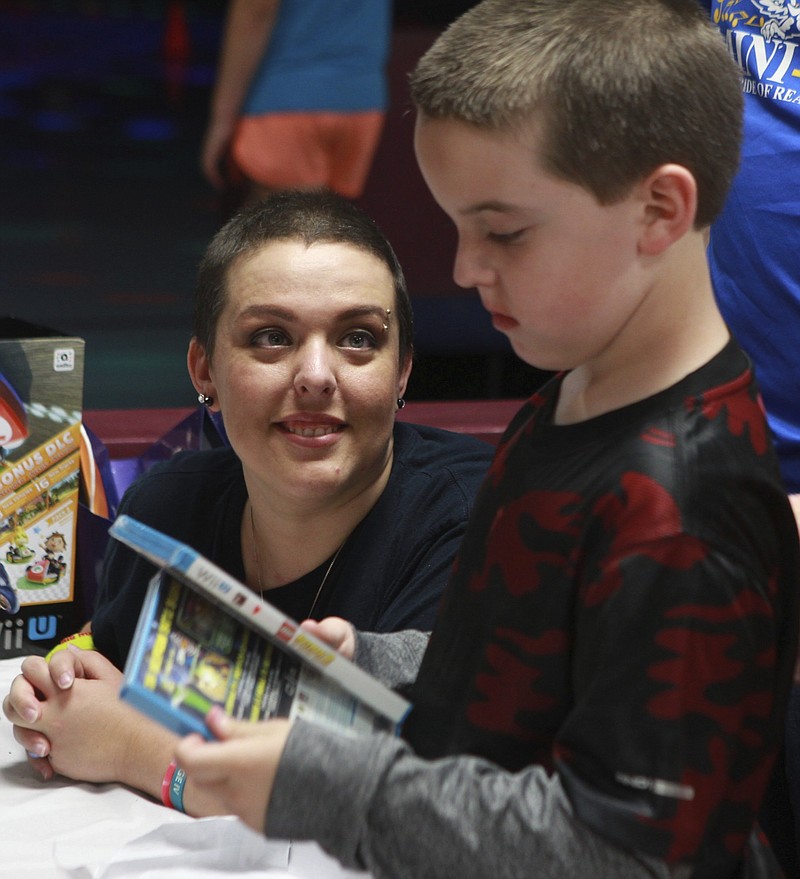BIG LAKE, Texas-Since her diagnosis, Jennifer Cooper has counted time by birthdays and holidays.
Cooper, 34, of Big Lake, is in in-home hospice because of her incurable and ultimately deadly disease: stage IV breast cancer, also referred to as metastatic breast cancer.
"I knew it. I just had a feeling, as soon as I touched this bump on the top of my head, I knew what it was," she told the San Angelo Standard-Times about the cancer spreading. "Just like when I touched that lump in my breast, as soon as I felt that lump I knew what is was. I knew my cancer was going to come back, but I was hoping for a little longer than three months."
Metastatic breast cancer is a progressive cancer that originates in the breast and spreads to other parts of the body, such as the brain, lungs, liver or bones.
October is commonly recognized with the prevalent colors of orange and black for Halloween, but pink also dominates the month as people celebrate survivors and raise breast cancer awareness.
But Cooper hates pink. Not so much the color, but what it represents and what it forgets-women who don't survive, and a lack of funds dedicated to research metastatic cancer.
"Can we stop talking about awareness and start looking at how to prevent these survivors from becoming stage IV?" she said. "Let's keep them as survivors. I am what you don't want to be when you're a breast cancer patient. And I would much rather give my money to an organization where 100 percent of their profits goes to research."
An estimated 40,000 women and men die of breast cancer every year in the United States. However, research focused on metastatic breast cancer made up only 7 percent of the $15 billion invested in breast cancer research from 2000-13 by major governmental and nonprofit groups from North America and the United Kingdom, according to the Metastatic Breast Cancer Alliance, which comprises 29 breast cancer advocacy groups.
"We don't really expect a cure, we just want to be chronic," Cooper said. "I'd rather be chronic than terminal."
A wife and mother of two, Cooper was diagnosed with stage IV breast cancer in 2014. Her cancer had a growth rate 97 percent. As of today it has spread to her right femur, the lining of her right lung, her fourth left rib with several chest lymph nodes, multiple lesions on her diaphragm, a cluster of bumps on top of her head and about six small tumors in her brain.
The treatment caused damage to her kidneys and spleen, so chemotherapy was stopped.
"I am terrified to know what the inside of my body looks like right now considering I've been off treatment for two months," she said. "I am just sitting here growing cancer."
Last October, Cooper celebrated her oldest son's 8th birthday with family and friends at Angelo Skate and Fun Center, where she raced a go-kart, played laser tag and made it through a few of the 18 miniature golf holes of before she had to take a break because of trouble breathing and pain in her diaphragm.
Now she is in bed most of the day because of the four pain medications she takes, and she hardly gets to spend time with her sons, who complain she's always sleeping.
Cooper is adamant that one day out of the year is not enough focus on the disease that claims thousands of women and men each year.
"When you're terminal like I am, you get left out," she said. "We have one day out of the whole month that is for metastatic women, and that's been taken over by the No Bra Day. People are telling you not to wear a bra that day like that does anything for research."
Learning to cope with her illness, Cooper has become an advocate in her own right, creating and posting videos to her YouTube account or Facebook page encouraging everyone to check themselves for lumps and demanding more funding for research into metastatic cancer.
Daring to do what a few would, she posted a photo of her bare chest, showing the scars from her double mastectomy, on her Facebook page, Coopdizzle. It took a year for Cooper to gather her courage to take the photo, which was well received from other women fighting to live.
She was unable to go through reconstructive surgery because scans for that process revealed her cancer had
spread.
Roughly 90 percent of all cancer deaths happen because of metastasis, said Kelly Lange, who is also living with metastatic breast cancer and is a board member of METAvivor, a volunteer nonprofit that donates 100 percent of its funds to metastatic research.
"Once you metastasize, your average life expectancy is only about two years, and that hasn't changed in decades, and we feel like these efforts at early detection and prevention haven't done enough to change the landscape for people living with metastatic disease," she said. "We're fighting to change
that."
The nonprofit is heading an effort called Stage IV Stampede to bring people from across the country to Washington, D.C., to advocate for advancing medical research and improving access to high-quality health care for people affected by the terminal disease.
The fight Cooper didn't start has taken two years to bring her to this point-two months on in-home hospice care checking off birthdays and items from her bucket list and hoping to make it to Christmas.
"I want people to know that you don't always have to be strong," she said. "Cancer is very scary, and it can make or break you spiritually. If you feel sad, then feel the sadness. If you feel angry, then feel that anger. Just don't let it stay with you. It's OK not to be OK. And that's just not for cancer patients. That's for everybody."

